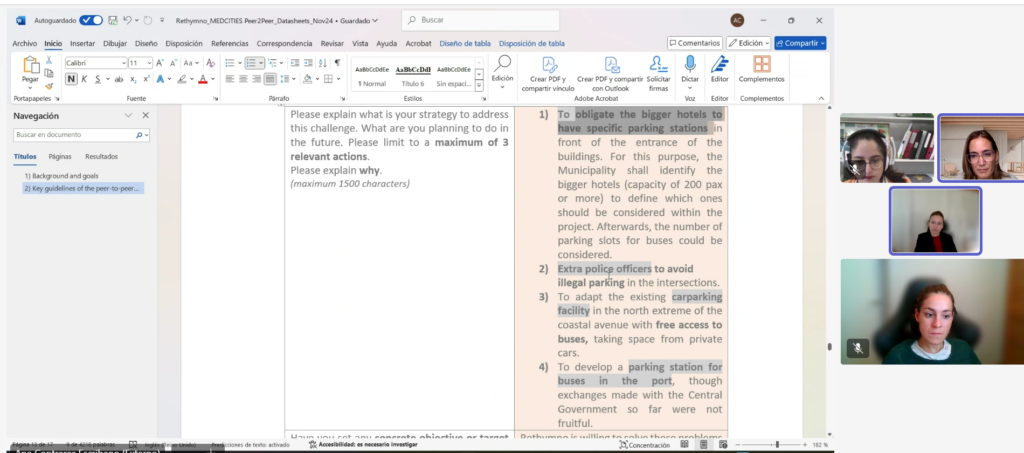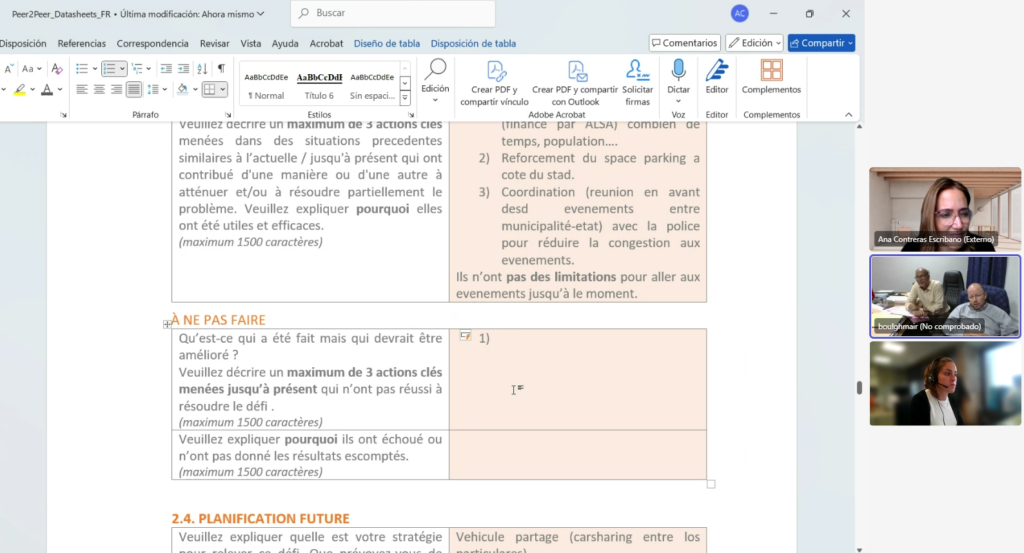Cities are at the forefront of problem-solving and face numerous challenges for which other cities’ experience can be the inspiration needed to enact successfully. As a network of cities, MedCities aims to promote city-to-city learning and the thematic working groups are an enriching and trust-based opportunity for it.
In this regard, the 2024 work plan of the working group on Sustainable Urban Mobility includes a new activity that aims to go beyond training and technical visits, and puts together two cities to learn from each other. The peer–to-peer programme was launched in September as a pilot and invited two cities of the group to share a concrete challenge related to their local mobility policies or project. The takers (Takers of advice) are the municipalities of Rethymno and Agadir.


In the case of Rethymno, the challenge proposed is how to better organise and regulate the access of tourist buses to the city center and visitor’s areas, where traffic congestion and quality of life are heavily compromised during tourist season. After some consultation to the group, the selected Giver city (Giver of ideas and inspiration) thanks to its experience as one of the main Mediterranean tourist destinations every year, is the city of Dubrovnik. Rethymno and Dubrovnik have met three times online to exchange on their respective local contexts, reguatory frameworks, municipal competencies and policies, etc. Dubrovnik has shared its pathway towards better regulation of time slots and specific areas dedicated to touristic buses to reduce congestion and traffic in the city center. Next 4 December, both cities will be meeting again to conclude the exchange with some concrete takeaways.
In the case of Agadir, the interest is to discuss concrete measures to decarbonise mobility related to the upcoming International sports events the city will be hosting in 2025 and 2040 (African Football Cup and Football World Cup). The municipality will learn from Madrid’s experience organising a golf championship that aims to be sustainable in different fields, including mobility.
The main product of the peer-to-peer programme will be finalised for both cases mid-December and will include a brief set of recommendations and takeaways for each taker on the concrete use of the givers’ experience on their particular case.
The peer-to-peer initiative focuses on cities’ own experience, lessons learned and recommendations, and is facilitated by the MedCities Secretariat and the experts of ACE-RTA, who take care of planning, organising and summarising the main conclusions of the bilateral meetings. The peer-to-peer exchanges have been conducted online during November and will be closed in its pilot phase in mid-December.
This activity is framed by the MedCities working group on sustainable urban mobility. The working groups are aimed to support the network’s city members to learn and exchange from each other and from pioneering cases in the region. The working group on Sustainable Urban Mobility started its work in 2023 and has the following thematic areas as its key priority topics :
Redefining public space to humanise cities.
Subscriu-te al nostre butlletí mensual per rebre totes les notícies.

Nam porttitor blandit accumsan. Ut vel dictum sem, a pretium dui. In malesuada enim in dolor euismod
Nam porttitor blandit accumsan. Ut vel dictum sem, a pretium dui. In malesuada enim in dolor euismod

Nam porttitor blandit accumsan. Ut vel dictum sem, a pretium dui. In malesuada enim in dolor euismod

Nam porttitor blandit accumsan. Ut vel dictum sem, a pretium dui. In malesuada enim in dolor euismod
Nam porttitor blandit accumsan. Ut vel dictum sem, a pretium dui. In malesuada enim in dolor euismod

Nam porttitor blandit accumsan. Ut vel dictum sem, a pretium dui. In malesuada enim in dolor euismod